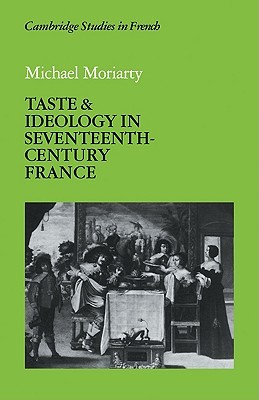
- We will send in 10–14 business days.
- Author: Michael Moriarty
- Publisher: Cambridge University Press
- ISBN-10: 0521113369
- ISBN-13: 9780521113366
- Format: 14 x 21.6 x 1.4 cm, softcover
- Language: English
- SAVE -10% with code: EXTRA
Taste and Ideology in Seventeenth-Century France (e-book) (used book) | bookbook.eu
Reviews
Description
This book analyses the use of the crucial concept of 'taste' in the works of five major seventeenth-century French authors, Méré, Saint Evremond, La Rochefoucauld, La Bruyère and Boileau. It combines close readings of important texts with a thoroughgoing political analysis of seventeenth-century French society in terms of class and gender. Dr Moriarty shows that far from being timeless and universal, the term 'taste' is culture-specific, shifting according to the needs of a writer and his social group. The notion of 'taste' not only helped to shape a new dominant culture, but also registered the conflicts within that culture between a view of taste that presupposted the values of 'polite society' as an exclusive (though not necessarily aristocratic) group, and a view that stressed the value of the classical-humanist tradition as a source of standards ratified by a broader public. this study sheds light not only on the central concept, but also on the individual authors discussed and on the norms of French classical literature in general.
EXTRA 10 % discount with code: EXTRA
The promotion ends in 17d.08:44:28
The discount code is valid when purchasing from 10 €. Discounts do not stack.
- Author: Michael Moriarty
- Publisher: Cambridge University Press
- ISBN-10: 0521113369
- ISBN-13: 9780521113366
- Format: 14 x 21.6 x 1.4 cm, softcover
- Language: English English
This book analyses the use of the crucial concept of 'taste' in the works of five major seventeenth-century French authors, Méré, Saint Evremond, La Rochefoucauld, La Bruyère and Boileau. It combines close readings of important texts with a thoroughgoing political analysis of seventeenth-century French society in terms of class and gender. Dr Moriarty shows that far from being timeless and universal, the term 'taste' is culture-specific, shifting according to the needs of a writer and his social group. The notion of 'taste' not only helped to shape a new dominant culture, but also registered the conflicts within that culture between a view of taste that presupposted the values of 'polite society' as an exclusive (though not necessarily aristocratic) group, and a view that stressed the value of the classical-humanist tradition as a source of standards ratified by a broader public. this study sheds light not only on the central concept, but also on the individual authors discussed and on the norms of French classical literature in general.


Reviews